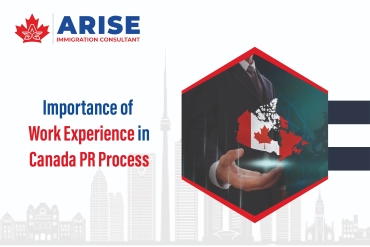The Immigration, Refugees and Citizenship Canada (IRCC) takes into account the skilled and qualified job experience in any of the occupations stated in the National Occupational Classification (NOC). Even the professional experience obtained during studies is counted when IRCC assesses the PR visa applicant’s eligibility. An individual’s job experience would be considered if he/she applies for the Federal Skilled Worker program via the Express Entry category.
Most of Canada’s migration policy places an emphasis on skilled work experience. Some programs, such as the Federal and Quebec Skilled Worker programs, also have the words ‘skilled work’ in their names.
Many prospective immigrants may be uncertain what comprises ‘skilled work’ for immigration purposes. Furthermore, others may be unaware of whether their own experience counts as ‘skilled’ by immigration officials. Let’s discuss what is meant by skilled work experience and its criticality in the Canada PR process.
Importance of Work Experience in Canada PR Process

Explanation of skilled work
Any area of work undertaken in Canada is registered in a National Occupation Classification database maintained by the Canadian government. Jobs are categorized in various levels in this database. These levels include
There are two versions of CELPIP, namely:-
- 0 level – Consists of managerial jobs
- A level – Consists of professional jobs, a university degree is typically needed
- B level – Technical jobs, post-secondary schooling, an internship, or two years or more of on-the-job training is usually needed.
- C level - Semi-skilled occupations, seeking only a high school diploma and minimal practice
- D level - Unskilled jobs, requiring minimal training and no specific educational qualifications
When immigration officials talk about skilled candidates, they normally mean people who have worked in a NOC 0, A, or B position.
Work experience gained while pursuing studies
According to this provision, job experience would be accepted whether you served part-time or full-time while earning your graduation or post-graduation degree. Work experience gained during studies may contribute towards basic requirements if the role was regular without any job gaps, paid by compensation or incentives, and meets all other application requirements.
Student job experience acquired while studying in Canada or abroad contributes against the Federal Skilled Worker Program’s minimum requirements. However, it does not count against the Canadian Experience Class or the Federal Skilled Trades Program’s minimum requirements.
Skilled work experience
Points will be awarded only for full-time jobs, not for temporary work. Your profession must be classified in the NOC as Skill Type 0 or Skill Level A or B. For your professional experience to be accepted by the IRCC for a PR visa application, you must demonstrate that you have fulfilled the duties mentioned in the main declaration of the professional description in the NOC.
Below points must be noted:–
- Your skilled work experience must be in the same type of employment (with the same NOC) as the job you choose to use for the visa application, referred to as your primary occupation
- It must be during the last ten years
- It must be a paid work (volunteer work or internships will not count)
- Must be continuous work for a minimum of one year, i.e. total 1,560 hours, 30 hours weekly
All four tests are conducted within 3 hours.
Demonstrating your skills
Simply having a professional experience is not sufficient. Immigration officials want candidates to provide evidence of their qualifications and work experience. Although the programs differ marginally, the documentation needed to demonstrate professional work experience may also differ based on the individual and their occupation.
Aspirants should anticipate providing any or all of the below mentioned information:
- CV or resume
- Academic diplomas, with Canadian equivalency grades
- Professional certifications, if any
- Pay slips and other employment records
There are many other options for people with semi-skilled or unskilled employment who want to move to Canada. One choice is to search for jobs as a seasonal migrant person. Another choice is to immigrate to the country as a student and gain experience and prepare for a PR visa application.
Irrespective of the route the applicants take to Canadian Permanent Residency, qualified candidates could become part of one of the world’s most multicultural, free, and economically stable communities.
Summary
For several years, skilled worker immigration is at the heart of Canada’s immigration process. It is one of the factors that contribute to Canada’s current economic growth. Recent reforms, such as requiring candidates to have Canadian educational equivalency grades, have made it easier for immigrants to find work and adjust to life in the country than ever before.
Work experience can also help you improve your Comprehensive Ranking System (CRS) ranking. You must have a minimum of one year of professional experience to earn the minimum points. You can win more points if you have additional years on the job. To be competitive in the Canada PR application, having admissible work experience is vital.
The entire immigration application process can be very daunting. It is best to seek help from renowned immigration consultants so that you won’t have to deal with any hassles when it comes to the steps and conditions for completing your visa paperwork. Whether you wish to visit, study, work, or migrate to Canada, our expert consultants will assist you with all of your requirements and ensure that your aspirations of relocating to Canada become a reality.
Success Stories
What Client Say About Us
Canada PR
Ahmedabad Client Canada PR Success Story Of Arise Canada PR Consultant ONTARIO PNP Without Job Offer
Canada PR
Ahmedabad Client Canada PR Success Story Of Arise Canada PR Consultant Nova Scotia PNP without LMIA
Canada PR
Ahmedabad Client Canada PR Success Story Of Arise Canada PR Consultant Nova Scotia PNP without LMIA

Scan the QR to call











